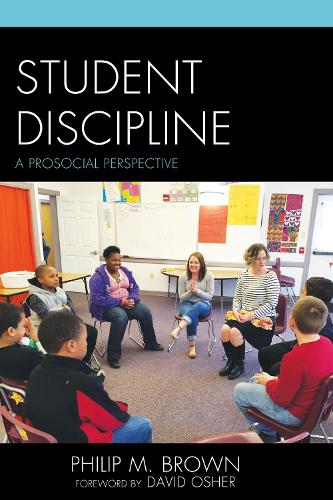
Student Discipline: A Prosocial Perspective
(Paperback)
Available Formats
Publishing Details
Student Discipline: A Prosocial Perspective
By (Author) Philip M. Brown
Bloomsbury Publishing PLC
Rowman & Littlefield Publishers
3rd February 2016
United States
Classifications
Professional and Scholarly
Non Fiction
Educational strategies and policy
Social and ethical issues
Educational administration and organization
371.1024
Physical Properties
Paperback
172
Width 154mm, Height 229mm, Spine 13mm
268g
Description
The foundation for a safe school rests on the creation of a healthy school climate, a caring community where students feel safe and relationships facilitate prosocial growth as well as academic learning. A balance of structure and support is essential, and requires an organized, schoolwide approach that is practiced by all school personnel. Codes of student conduct that rest on core ethical values rather than just rules and punishment are a start. Recognizing that teachers are moral educators and schools model expectations for citizenship undergirds the prosocial school. From PBIS and restorative justice to mindfulness and the importance of play, from academic integrity to peer group support, we examine the science and evidence-informed programs that support a prosocial approach to school discipline. Eight schools from across the country that have struggled and learned to be beacons of prosocial school approaches are highlighted through summaries and links to their stories. Proactive responses to the U.S. Department of Education's Guiding Principles on School Discipline are provided by education law experts from the National School Climate Center and the New Jersey Principals and Supervisors Association.
Reviews
Disciplinary practices support learning or tragically undermine childrens healthy development and success. Today, too much of disciplinary policy and practice is punitive, unhelpful and feeds the high school to prison pipeline. Student Discipline: A Prosocial Perspective is a terribly important book for practice and policy leaders who are invested in making schools a place that support life as well as school success. I highly recommend this book to you. -- Jonathan Cohen, PhD, president, National School Climate Center
Phil Brown and his colleagues provide needed inspiration and guidance for schools that wish to move away from a focus on control and obedience to student-centered concerns like belonging and autonomy. The set of readings lights the path towards creating school cultures that emphasize prosocial development instead of punishment, active citizenship instead of self-protective concern. Its a sure bet for educators! -- Darcia Navrez, PhD, professor, Department of Psychology, University of Notre Dame
A prosocial education approach to discipline returns all educators to the central question of how to guide students toward exemplary behavior. No longer can codes of conduct simply define infractions and penalties. Phil Brown has gathered diverse approaches toward the goal of showing how we can and must aspire to character-building outcomes of our discipline policies and practices, steeped in equity and respect for human dignity. -- Maurice J. Elias, PhD, professor of clinical psychology, Rutgers University, author of The Other Side of the Report Card: Assessing Students' Social, Emotional, and Character Development
Phil Browns new book Student Discipline: A Prosocial Perspective is an excellent resource for educators concerned about discipline and classroom management. Dr. Brown articulates that discipline needs to be looked at as a life-long developmental process and not just a system of rules and punishment. Certainly conventional wisdom has led to failed policies such as zero tolerance with disproportionate consequences, particularly on students of color. His book offers a comprehensive look at a variety of successful programs and the latest research from neurobiology. The book includes eight school profiles with different approaches to prosocial discipline. The educator looking to learn what works best will find much to compare, discuss and digest here. -- Becky Sipos, president and CEO, Character.org
Author Bio
Philip M. Brown, Ph.D. is a Senior Consultant for the National School Climate Center and a Fellow, Center for Applied Psychology at Rutgers University. He founded the New Jersey Alliance for Social, Emotional and Character Development, created the regulatory structure for student support services for the NJ Department of Education, and authored and edited numerous publications and articles, including the two volume, Handbook of Prosocial Education (Rowman & Littlefield, 2012.)
